Swansea City’s patience eventually paid off against a stubborn Bolton Wanderers side who saw two players sent off during the game at the Liberty Stadium. Graham Potter’s side needed 80 minutes to get off the mark as Oli McBurnie finally found a breakthrough against Bolton’s nine men before substitute Bersant Celina added a second in the 92nd minute to guarantee the three points.
In this EFL Championship tactical analysis, we’ll take a detailed look at the key tactical battles and why Swansea struggled to penetrate a defensive Bolton side that looked like their game plan was to leave South Wales with a point. They nearly did, but their discipline let them down.
Craig Noone’s pull-back on Nathan Dyer inside the penalty area saw him booked before a foul on Oli McBurnie gave the referee a straightforward decision to show him a second booking just before half time. On 73 minutes, Bolton Wanderers were down to nine men when Wheater brought down Wayne Routledge near the halfway line as the last man, denying the Swansea winger a clear run through on goal.
It was only when Bolton were down to nine men that space opened up for the home side, allowing them to finally break through.
Lineups
Wyscout identified Swansea City as setting up with a 4-4-2 formation with Oli McBurnie and Dan James leading the line. WhoScored.com, meanwhile, believed it was a 4-2-3-1 for the Swans with Dan James playing as a number 10 behind Oli McBurnie.
So, what was it? Well, in short, manager Graham Potter rotated his front line, and within 20 minutes James had moved from a central position to a wide left role. Up until then, both James and McBurnie had swapped roles with McBurnie, in particular, dropping very deep to help link up the play.
The striker and Swansea’s top goalscorer this season created six chances for his side during the game, more than any other player. This suggests that he was playing more as a number 10 rather than a number nine.
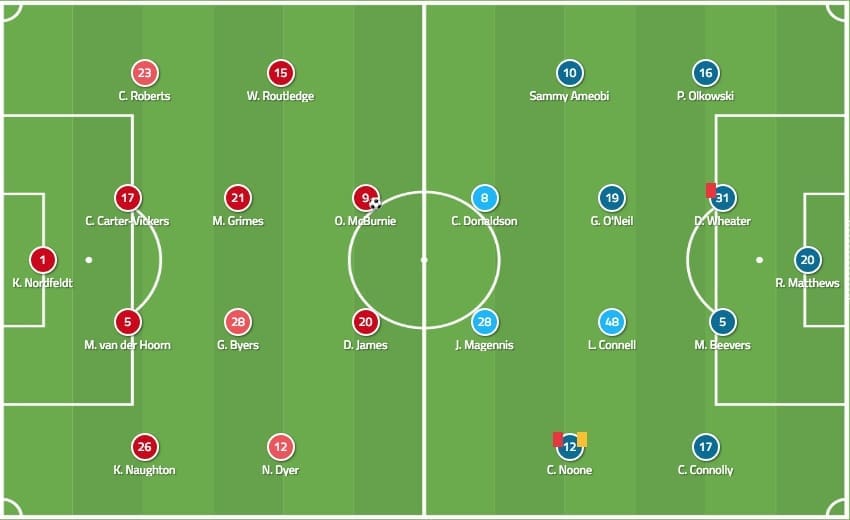
Below shows the position that Dan James played in during the first 15 minutes of the game. He was often originally in a central position but moved side to side as per which side of the pitch his side attacked through.

Bolton’s defensive shape
There can be no disputing Bolton’s system, however. Phil Parkinson most certainly adopted a 4-4-2 formation, and this was clear to see out of possession in the early exchanges as they sat deep inside their own half.
You can see below how Bolton sit back in their 4-4-2 structure. Swansea City have three players in space in between their defensive and midfield lines but Bolton blocked the passing lanes to these areas.

Bolton didn’t commit to a high press and were happy for Swansea’s centre backs and Matt Grimes to bring the ball out from the back. Instead, they focused on plugging the gaps and ensuring the hosts had little to no space to work with as they moved the ball towards the final third.

As well as blocking the passing lanes, using their front two to block passes through the centre, they also ensured that they always pressed the player receiving the ball through the inside channel. They recognised that this was key to ensuring that Swansea couldn’t advance their attacking moves down the flanks and in behind their defence.

The anchorman in these areas that you can see in the above and below screenshots have been featured on more than one occasion in previous tactical analysis articles.
Graham Potter likes his side to aim passes into these deep half-space positions to help link up attacking moves down the sides. They had similar trouble utilising this tactic at home against Birmingham City and later resorted to aiming longer, chipped passes for wingers to chase in behind.
Bolton manager Phil Parkinson recognised this too. His side ensured that they always had at least one player coming out of their line to press the receiver in this area of the pitch.


This proved to be effective for Bolton Wanderers as they broke up Swansea’s attacks a number of times in these positions. They didn’t have an attacking outlet to aim for though, and the home side were soon back in possession.
The pitch map below shows Swansea City’s losses of possession by Nathan Dyer (5), Dan James (3), Wayne Routledge (7) and Oli McBurnie (6) during the 90 minutes. Of the team’s total 26 losses, 17 of them were in the first half before Swansea City made subtle changes to avoid these losses in the inside channels.
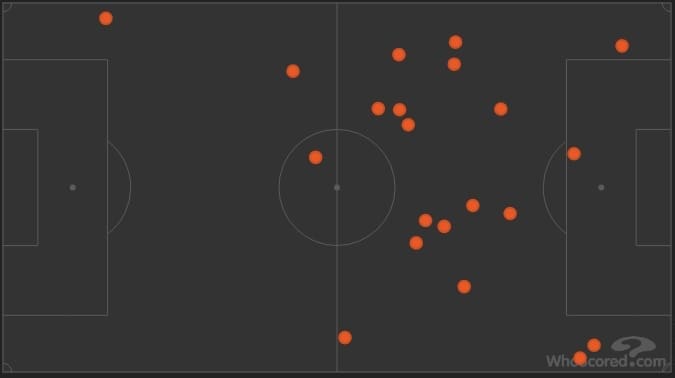
Bolton also dropped their two wide midfielders back as you can see below, almost creating a six-player defensive line.


Swansea City’s slow, one-dimensional attacking play
Throughout the game, Swansea City were guilty of playing slow and safe. They looked happy, for the most part, to play it simple rather than trying to aim balls in behind Bolton’s defensive line. Not only that, but their final ball and decision-making in the final third were also lacking.
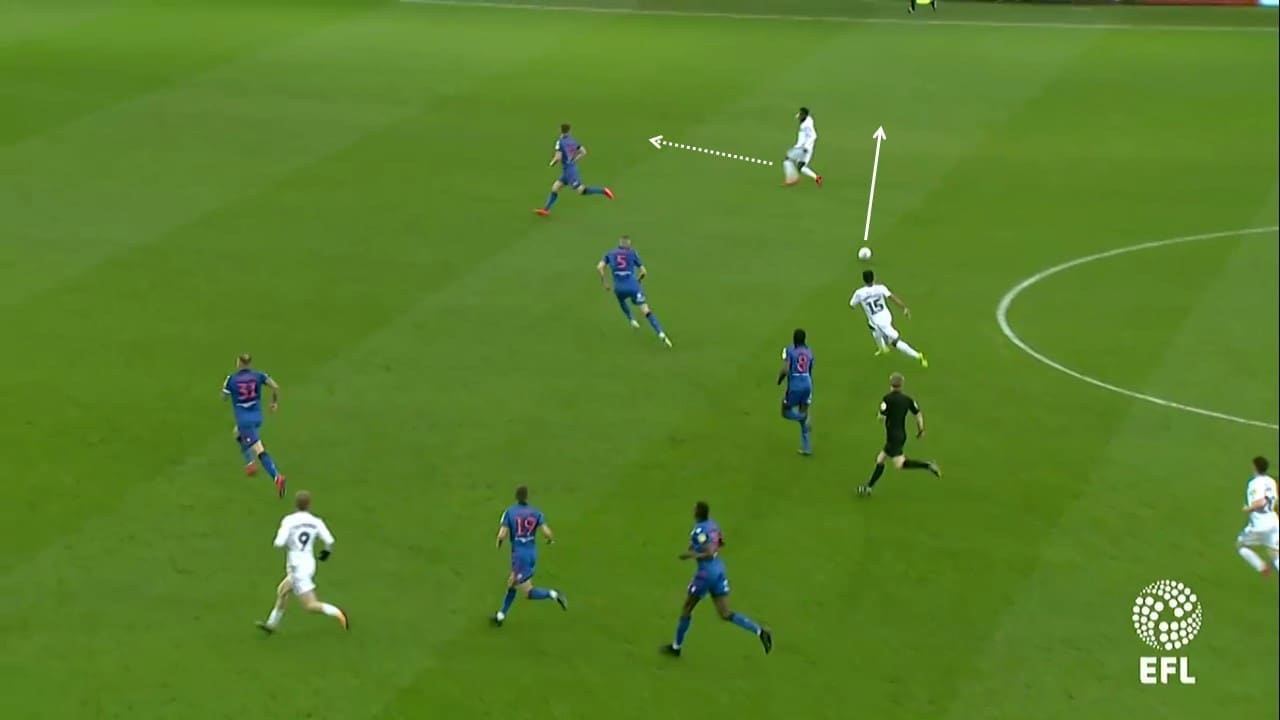

Another habit Swansea City have shown this calendar year is attempting to play through busy wide areas. Opposition teams are becoming well aware to outnumber Potter’s side in wide areas and closely mark their wide-men.
Below, Bolton have the wide area covered. Nathan Dyer has dropped deep to receive a pass from former Ajax defender Mike van der Hoorn and Swansea have nobody else ahead of Dyer down that right flank to offer an attacking passing option. As a result, a lot of Swansea’s play is sideways and in front of the opposition.

In the below example, Swansea City, again, look to play the ball through the ride side of the pitch where Bolton outnumber their hosts.
Oli McBurnie is surrounded by Bolton players in the blue shaded area and if he receives the ball he’ll be quickly pressed. This is not needed in this example as they have already blocked the passing lane to him.

Against a defensive Bolton side that weren’t given up much space in their own half, Swansea City needed to make more use of opportunities like these below when they won back possession in their own half. The shaded area below shows the amount of space Swansea could work with as Bolton look to get back into their shape after an attack breaks down.
However, the ball is slowly moved up the right-hand side of the pitch through Byers and then Dyer. But with a complete lack of intensity in their play to move the ball forward, Bolton are already back in shape before Swansea City get near the edge of the final third.

Graham Potter makes changes
Swansea City manager Graham Potter needed to make some tactical adjustments early on as his side were struggling to find space to create goalscoring opportunities. In an effort to get more balanced width in the side, he moved Dan James to the left and Wayne Routledge played through the middle with Oli McBurnie continuing to drop deep as a number 10.
Within moments of the switch, Dan James got on the ball and created a chance for McBurnie who was able to get in behind the Bolton defence for the first time in the game. He forced a decent save from the goalkeeper with a shot from about 10 yards out.

As mentioned previously though, James would often move inside off of his left wing to add support through the middle, rather than sticking to his wide position to offer an option of switching the play and away from a congested area.

Up until this point, Swansea City weren’t doing enough to try and shift Bolton out of their defensive shape. The visitors were always committing a player to move out of position to closely press the Swansea player receiving a pass through the inside channel.
Therefore, there were opportunities here to make use of the space left behind by the Bolton player pressing in the half spaces. With a player pushing forward and a Bolton player moving out of position to mark him, as shown below, there wasn’t another Swansea City looking to drop in and make use of that open space.

Eventually, though, Swansea City did start to try and be more inventive with their vertical passes. It had been all too safe for the most part of the opening 30 minutes but they did start to show some improvement as the first half went on.
Firstly, below we can see how Mike van der Hoorn looks to play a pass through for Wayne Routledge to chase in behind Bolton’s defence as Oli McBurnie drops deeper in an attempt to force a defender out of position.

In another example below, Swansea City now begin to make use of this free space as Nathan Dyer makes a forward run down the right flank. We saw in an earlier screenshot how Dyer had dropped far too deep, but he was now starting to make more forward runs down this side.
Here you can see the rotations amongst the Swansea forwards. Wayne Routledge is now the player dropping deep into that space in the inside channel. Bolton don’t have a player pressing in this zone now and he can play a first-time pass for Dyer to chase.
However, as was the theme throughout the game, the final decision or final ball was lacking. The red line in the example below shows that Dyer mistimes his run and the offside flag is correctly raised.

Further changes in the second half saw Oli McBurnie, in particular, dropping deep and playing first-time passes when receiving in the half spaces. In the first half he had been receiving passes and looking to hold up the play, but Bolton pressed tightly in these areas and possession was often lost.

After going down to 10 men just before half time when Craig Noone fouled Oli McBurnie for his second booking, Bolton were forced to sit back even deeper and more often than not played with six in defence.

Despite Bolton going down to 10 men, Swansea’s troubles in getting through them remained. Swansea often attacked far too narrowly and attempted to play passes through busy areas of the pitch in the final third.

Swansea City have often made use of the full-backs to offer attacking width but they didn’t do that so much in this game as you can see in the above image.
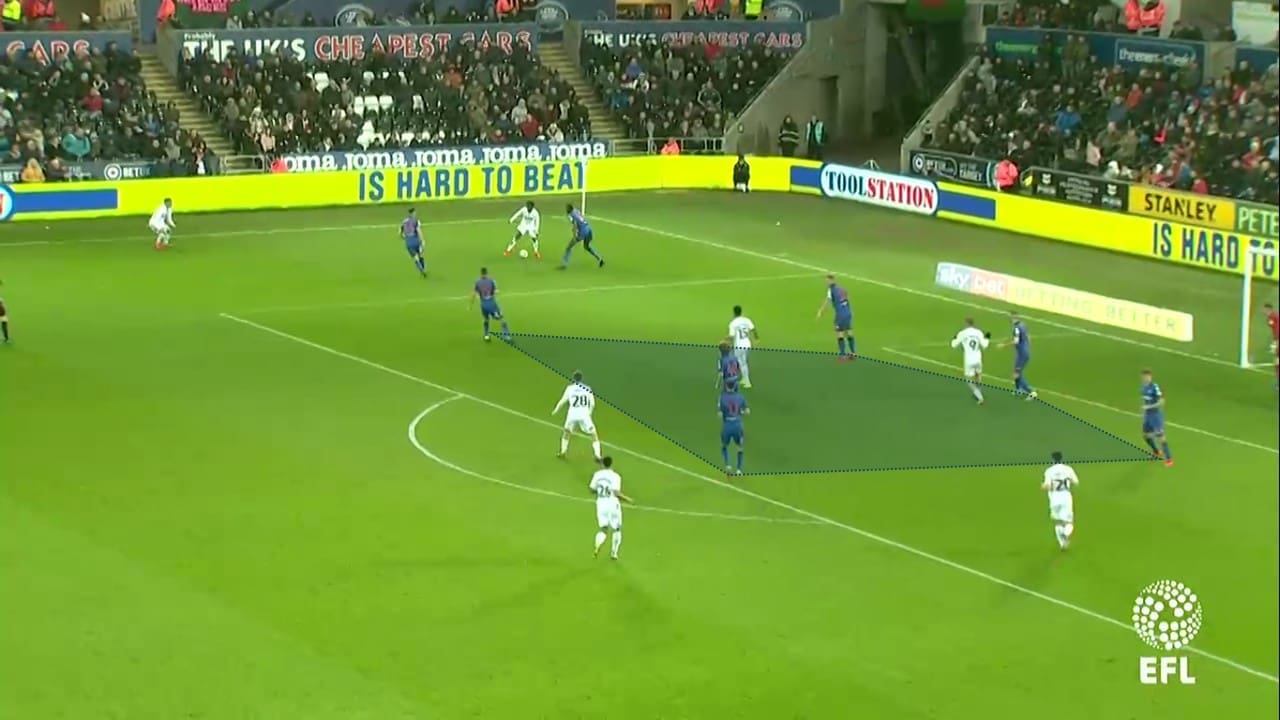
When Swansea did work the ball down the flanks, Bolton were still able to congest these areas and outnumber them.

Not only that, but crosses into the box were rarely a threat as Bolton often had double the amount of players in their own box as Swansea did to easily clear the danger.
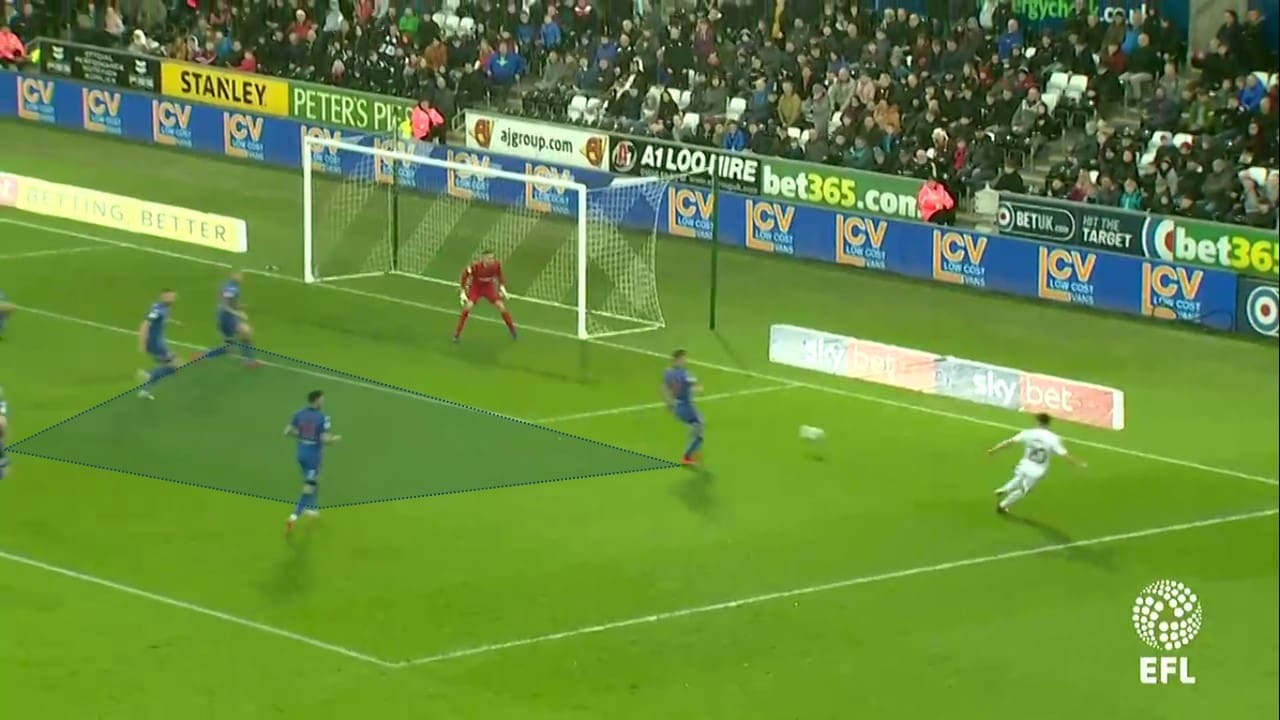
The screenshot below shows a rare occasion in the game when Dan James had plenty of space to run into in behind Bolton’s defence. Their left-back has pushed up to defend Kyle Naughton, leaving James free. However, the passing lane to him is blocked. Swansea were unable to play passes through in these situations.

Space begins to open up, Bolton down to nine and Swansea finally make a breakthrough
Bolton Wanderers were down to nine men on 73 minutes when David Wheater denied Wayne Routledge a free run through on goal as he intercepted a wayward sideways pass. Swansea City then finally found the net seven minutes later, and it came via a slice of luck and a sliced clearance.
Dan James was often making runs inside, looking to make quick link-ups through the middle. The goal starts off this way, and as James plays the ball towards the penalty area for Wayne Routledge, the ball goes loose.
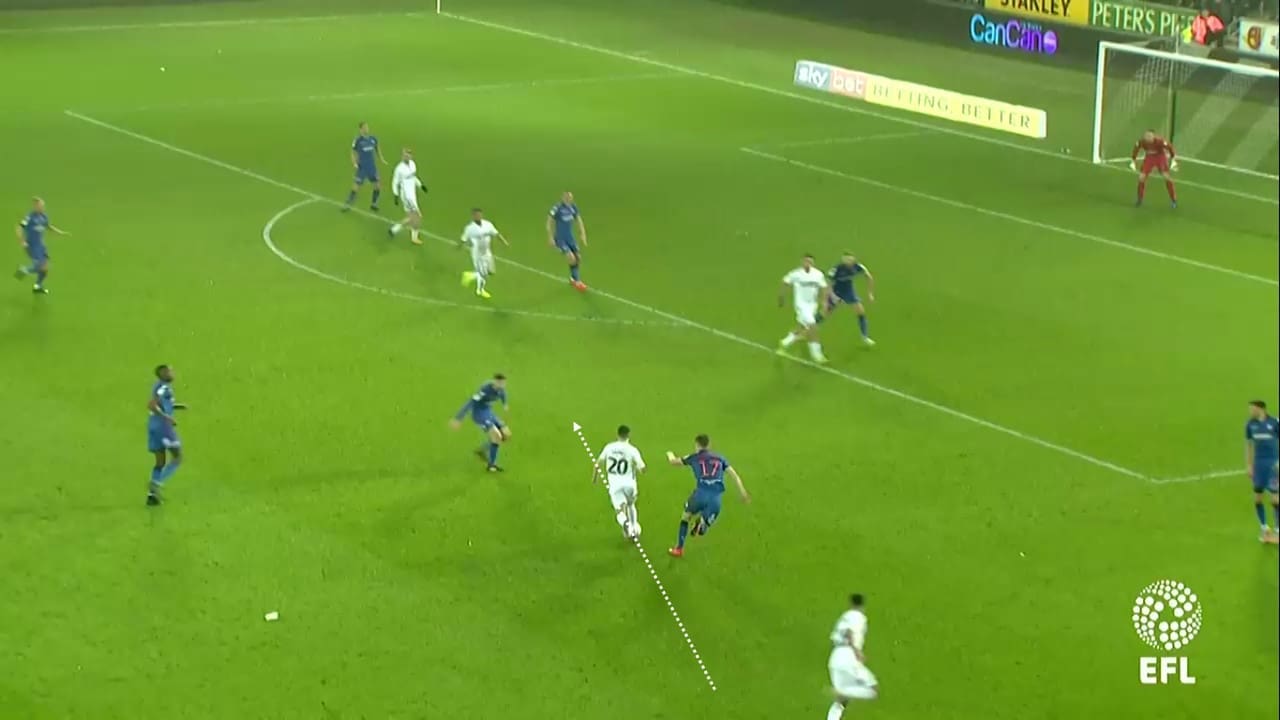
A Bolton defender attempts to make a clearance inside the penalty area but it’s sliced up in the air. Substitute striker Courtney Baker-Richardson nods the ball on and into the path of Oli McBurnie, who reacts the quickest to latch on to the ball and volley it home to give his side a 1-0 lead.
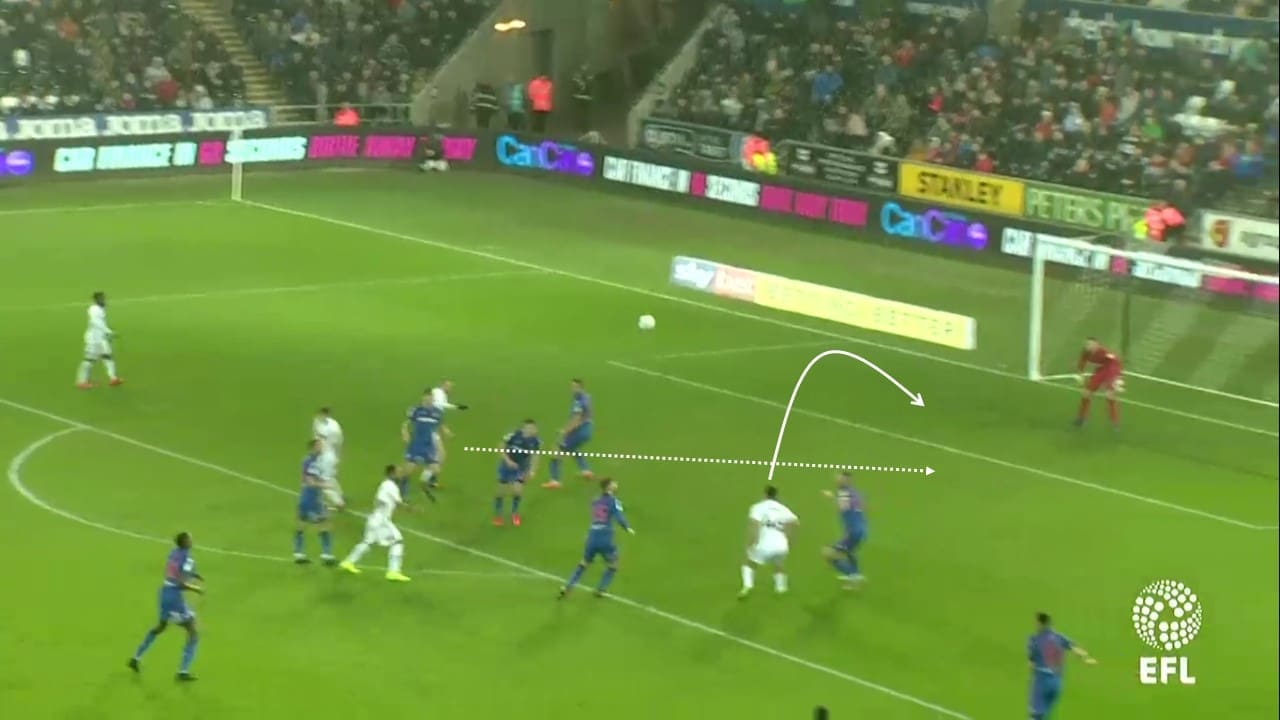
The goal forced Bolton, with nine men, to be somewhat less defensive. Ameobi moved from the right to occupy a central attacking position, looking to offer his side an attacking outlet up top as the visiting side now defended in a 4-3-1 shape, leaving more space for Swansea in wide areas.
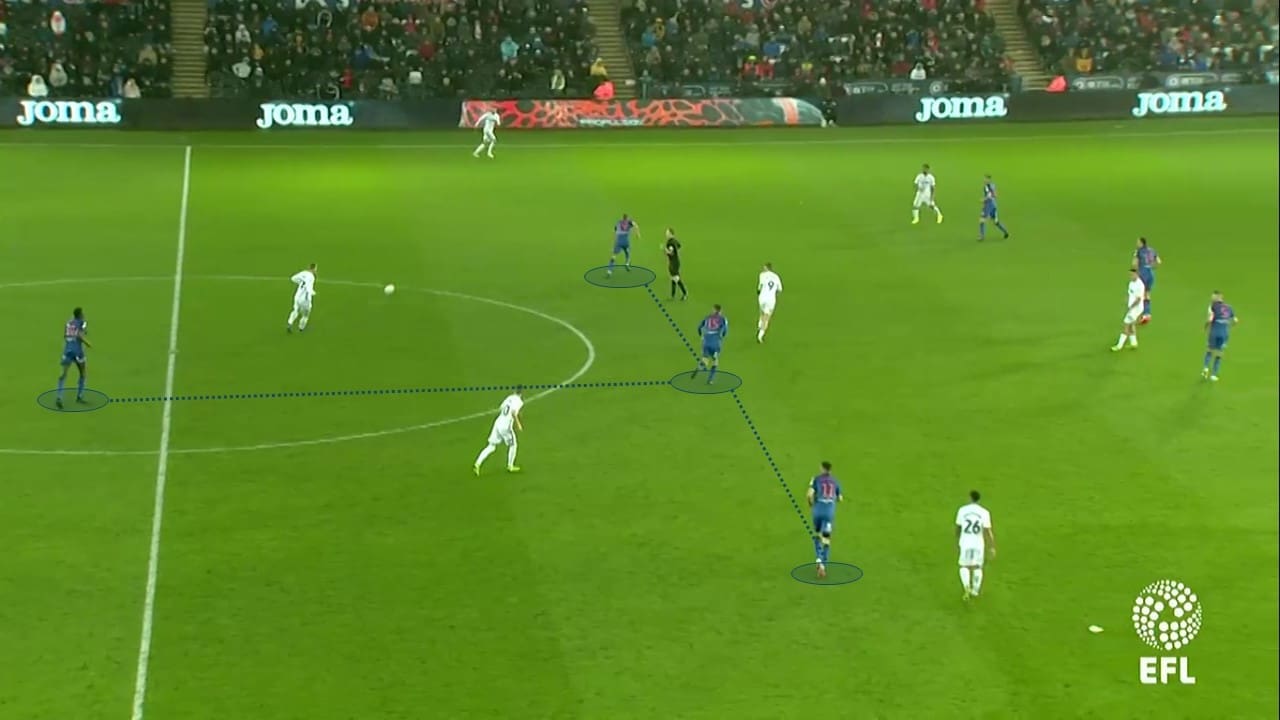
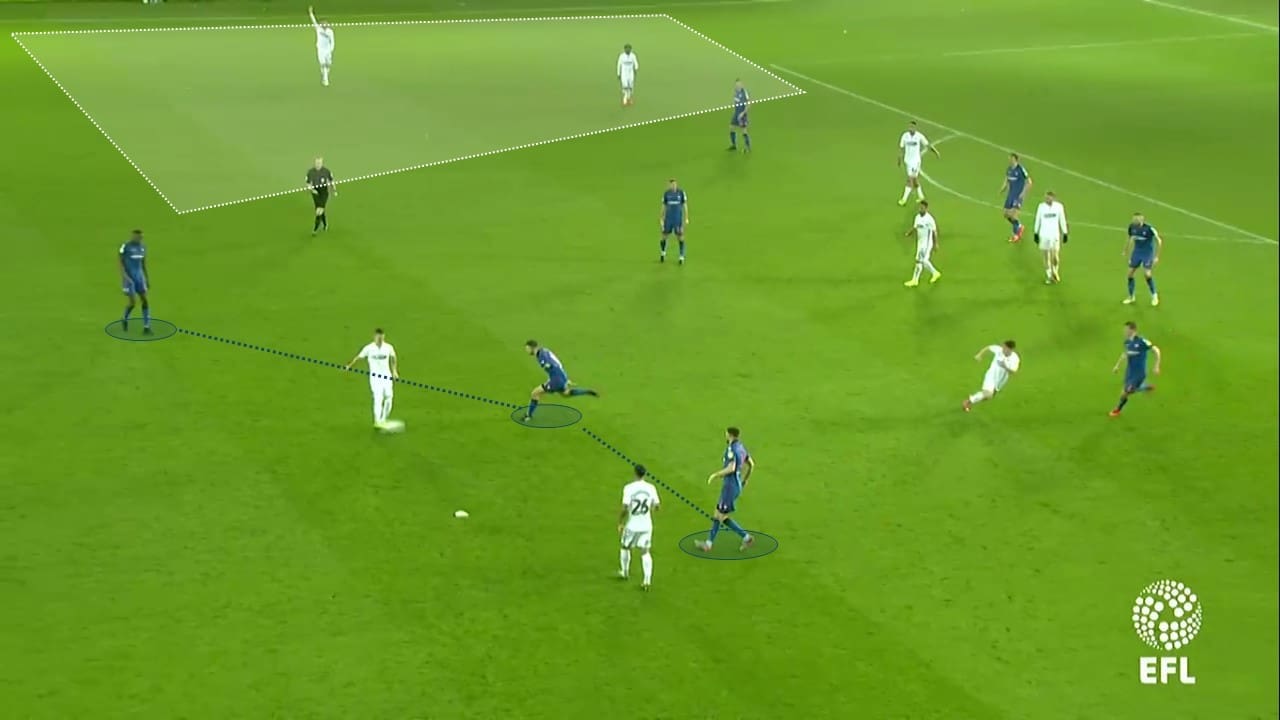
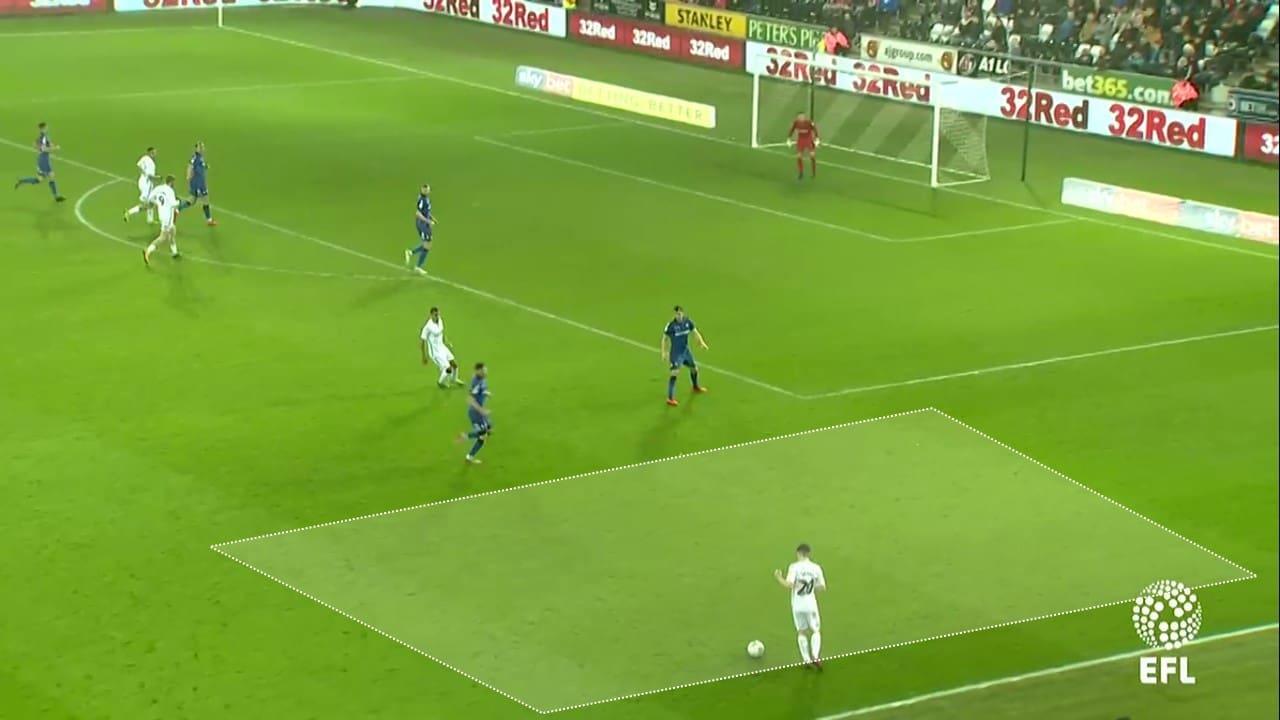
Swansea City added a second goal in injury time as substitute Bersant Celina was picked out by Dan James with a low cross from the right. Having gone a goal down and two men down by this stage, there were far more gaps opening up.
In the image below, Swansea City press a player in possession in their own half. Dan James wins the ball, McBurnie helps the ball forward and James can quickly get down the right to pick out Celina for the second.
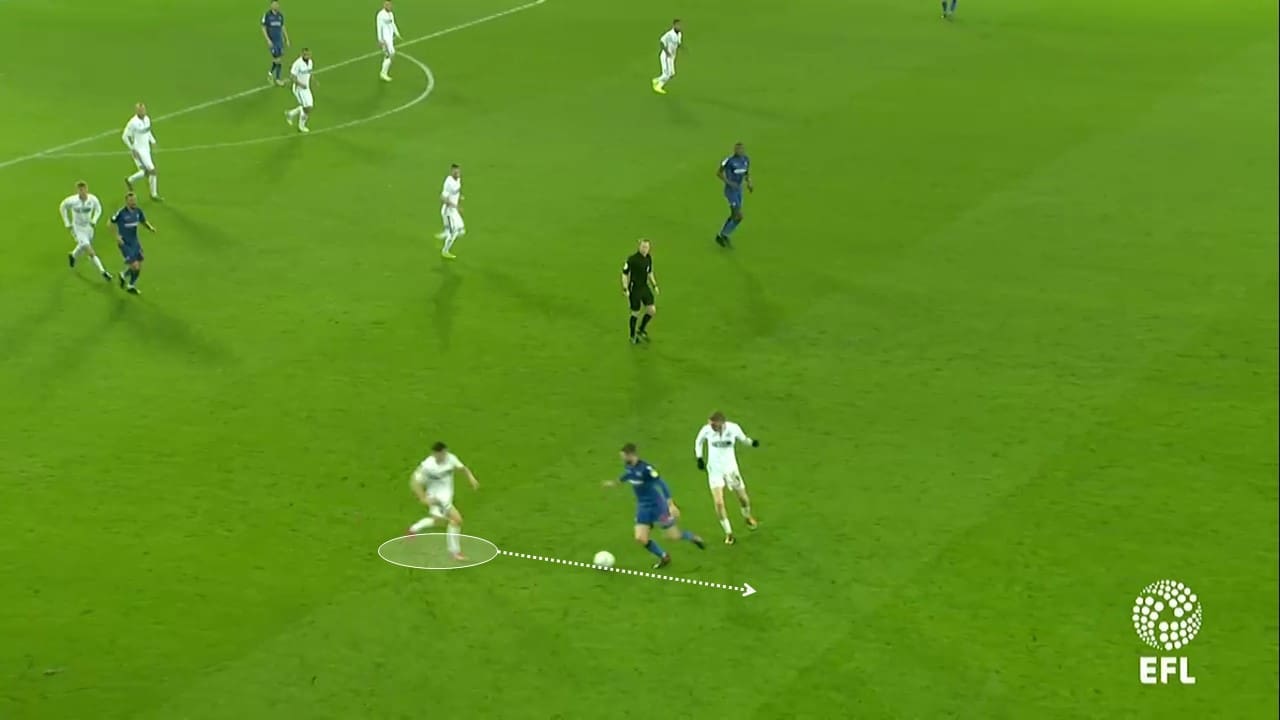
Conclusion
Swansea City found it difficult to get through a defensive and stubborn Bolton Wanderers side but they eventually succeeded once the visitors had gone down to nine men. Oli McBurnie could have made life easier for his side had he not missed his penalty in the first half, but he made amends during the 80th minute.
Swansea’s play was often too slow and they lacked the right amount of movement to shift Bolton out of their strict positioning. The visitors offered very little in front of goal. Nordfeldt was forced into making two saves during the first half, but other than that he had a quiet afternoon.
Graham Potter will need his side to show a big improvement ahead of Friday’s trip to Norwich City while Bolton continue to struggle at the foot of the table.
If you love tactical analysis, then you’ll love the digital magazines from totalfootballanalysis.com – a guaranteed 100+ pages of pure tactical analysis covering topics from the Premier League, Serie A, La Liga, Bundesliga and many, many more. Buy your copy of the February issue for just ₤4.99 here, or even better sign up for a ₤50 annual membership (12 monthly issues plus the annual review) right here.

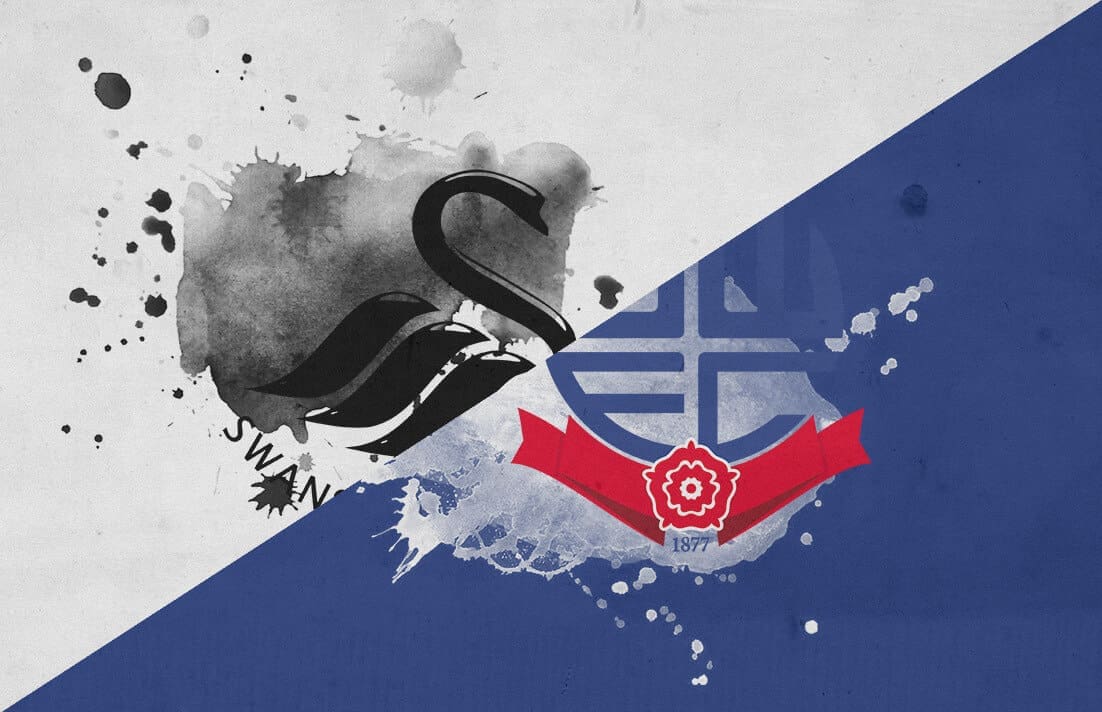




Comments